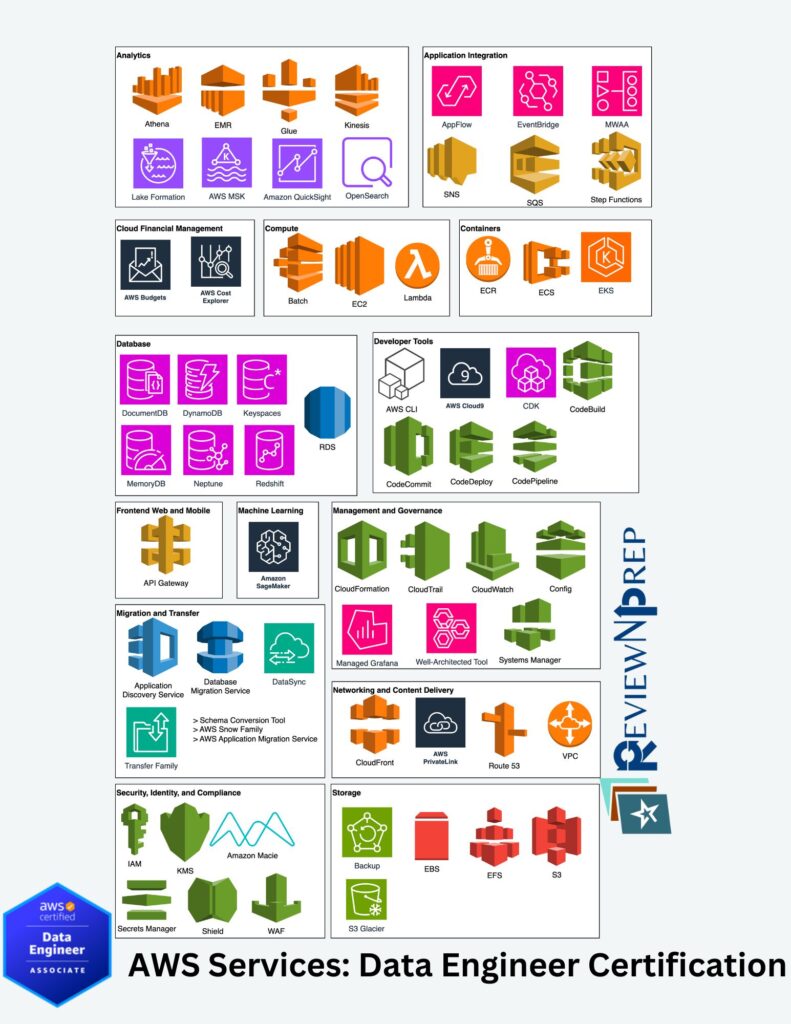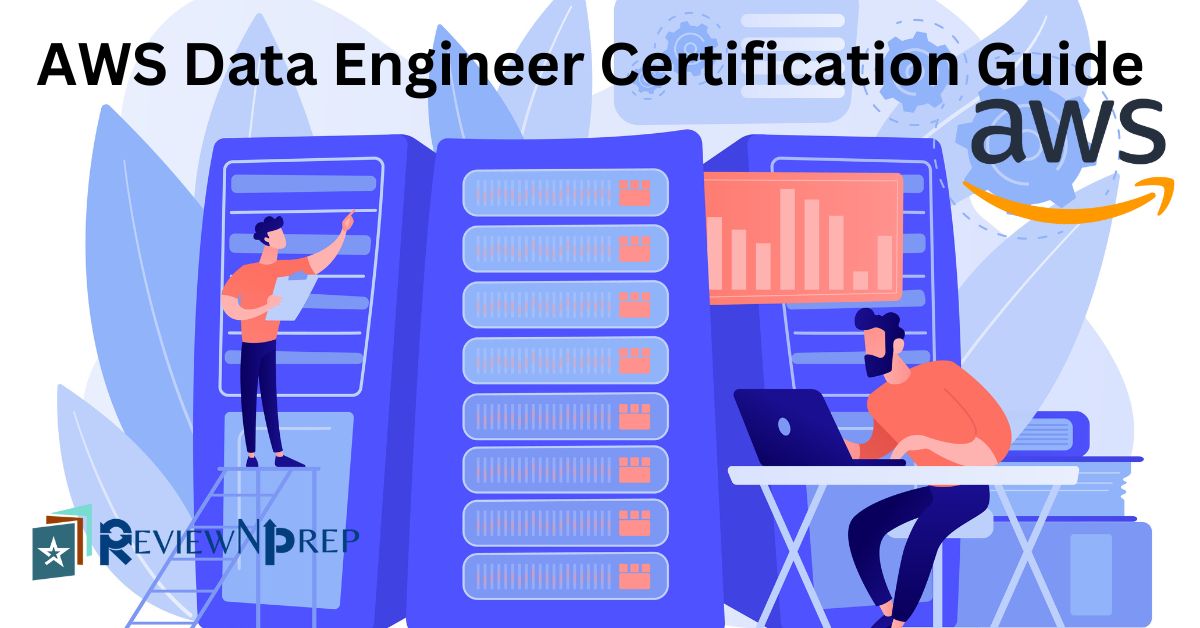Starting October 31, 2023, Amazon Web Services (AWS) is launching a new beta certification exam – AWS Certified Data Engineer – Associate. As per AWS, this certification validates your ability to implement data pipelines and to monitor, troubleshoot, and optimize cost and performance issues in accordance with best practices.
This guide covers everything you need to know to prepare for the exam and earn this valuable cloud certification.
Before we start, let’s talk about who is a data engineer and their job responsibilities.
Table of Contents
Job Responsibilities of a Data Engineer
Data engineers play a crucial role in managing and transforming data within an organization. Their job duties can vary depending on the specific needs of the company and the complexity of its data infrastructure, but here are some common tasks and responsibilities that data engineer role has to offer:
- Data Ingestion: Data engineers collect and ingest data from various sources, which can include databases, APIs, log files, and more. They design and implement processes to extract data efficiently and reliably.
- Data Transformation: They transform and clean the raw data to make it suitable for analysis. This includes tasks like data normalization, deduplication, data enrichment, and handling missing values.
- Data Storage: Data engineers design and maintain data storage solutions, which can include data warehouses, data lakes, or other data repositories. They ensure data is stored securely and efficiently.
- ETL (Extract, Transform, Load): ETL processes are central to a data engineer’s daily tasks. They create and maintain ETL pipelines to move and transform data from source to destination.
- Data Modeling: Data engineers design data models to represent the structure and relationships within the data. They may use concepts like relational databases or NoSQL databases, depending on the use case.
- Data Quality and Validation: Ensuring data quality is essential. Data engineers implement validation checks and quality controls to identify and correct errors or anomalies in the data.
- Performance Optimization: Data engineers work on optimizing data pipelines and storage systems for speed, efficiency, and scalability. They often deal with large datasets and need to ensure data access and processing is fast and cost-effective.
- Data Security: Data engineers are responsible for implementing security measures to protect sensitive data. They ensure data is stored and transmitted securely.
- Collaboration: They work closely with data scientists, analysts, and other stakeholders to understand data requirements and help deliver data solutions to meet those requirements.
- Monitoring and Maintenance: Data engineers continuously monitor data pipelines and systems to identify and resolve issues or bottlenecks. They perform routine maintenance and updates as needed.
- Documentation: They document data engineering processes, data dictionaries, and data lineage to ensure that others can understand and use the data effectively.
- Technology Evaluation: Data engineers stay up-to-date with the latest data engineering tools and technologies. They may evaluate new tools and frameworks to determine if they can improve data processes.
- Data Governance: They help establish and enforce data governance policies and standards, ensuring that data is used in a compliant and ethical manner.
- Problem-Solving: Data engineers often need to troubleshoot and solve data-related issues, whether it’s a pipeline failure or data inconsistency.
- Scalability: They plan for data growth and design systems that can scale to handle increasing data volumes and complexity.
Target Audience for AWS Data Engineer Associate (DEA-C01) Certification?
As per Talent.com, the average salary for an AWS Data Engineer in the USA is $141,900. With the advancement in AI and ML, the demand for data engineers is only going to go up and the career opportunities are plenty.
This certification is ideal for data professionals like data engineers, data architects, data analysts, and data scientists who perform complex big data analyses and build analytics solutions on AWS.
AWS recommends that target candidate should have the equivalent of 2–3 years of experience in data engineering. The target candidate should understand the effects of volume, variety, and velocity on data ingestion, transformation, modeling, security, governance, privacy, schema design, and optimal data store design. Additionally, the target candidate should have at least 1–2 years of hands-on experience with AWS services.
AWS Data Engineer Certification Exam Details and Format
The exam has the following format:
- Cost: $75 USD
- Duration: 170 minutes
- Question types: Multiple choice and multiple response
- Number of exam questions: 85 (The exam includes 15 unscored questions that do not affect your score). The final version of the exam will have 65 questions out of which 15 will be unscored.
- Passing score: 720/1000
- Validity: 3 years
Check the exam guide for the detailed exam outline and sample questions.
Domains Covered in AWS Data Engineer Certification
The exam has the following content domains and weightings:
1. Domain 1: Data Ingestion and Transformation (34% of scored content)
This domain carries significant weight, accounting for over a third of the total exam content. It places a strong emphasis on the core data processes of data ingestion, transformation, and management, as well as the orchestration of ETL (Extract, Transform, Load) pipelines for efficient data handling.
Candidates will delve into AWS services like Amazon Kinesis, Amazon Redshift, and DynamoDB streams, gaining a deep understanding of their functionalities. They’ll then apply this knowledge to transform data to meet specific requirements using tools such as Lambda, EventBridge, and AWS Glue workflows, allowing for the customization of data processing pipelines.
In addition to these hands-on skills, this domain also highlights the importance of foundational programming concepts. This includes mastering infrastructure as code, honing skills in SQL query optimization, and gaining proficiency in CI/CD (Continuous Integration and Continuous Delivery) methodologies for rigorous pipeline testing and seamless deployment. This comprehensive knowledge equips candidates with the tools and techniques needed to excel in AWS data engineering
2. Domain 2: Data Store Management (26% of scored content)
This domain primarily centers on the efficient storage and organization of data. It encompasses a range of tasks, including data modeling and the creation of schemas to accommodate various data types, be they structured, unstructured, or semi-structured.
Candidates are expected to possess a holistic understanding of AWS storage solutions. This includes the capacity to discern and opt for the most appropriate data repository, taking into consideration factors like availability and throughput requirements.
Furthermore, a critical facet of this domain involves adeptly managing the data lifecycle, with an emphasis on cost-efficiency, robust security measures, and fault tolerance. Such proficiency ensures that data is not only effectively stored but also consistently accessible, secure, and resilient.
3. Domain 3: Data Operations and Support (22% of scored content)
Within this domain, candidates undergo assessment based on their competence in leveraging AWS services for data analysis and ensuring data integrity via automated data processing. This encompasses the configuration of monitoring and logging mechanisms for data pipelines, and the adept utilization of services like CloudTrail and CloudWatch to facilitate the identification and resolution of operational challenges.
Moreover, a fundamental grasp of AWS Glue DataBrew is crucial, as it assumes a pivotal role in data lifecycle management, encompassing data preparation, transformation, the establishment of data quality standards, as well as data verification and cleansing procedures. This knowledge equips candidates with the tools necessary to maintain data pipelines efficiently and ensure data quality, promoting robust data-driven insights.
4. Domain 4: Data Security and Governance (18% of scored content)
The final domain places a significant emphasis on data security, authorization, and compliance within the AWS environment. Candidates are expected to have a deep understanding of the critical role of security in an AWS architecture and must be able to implement robust security measures within the VPC network infrastructure, as well as for user access control using AWS Identity and Access Management (IAM).
This involves the application of the principle of least privilege, which means granting users only the permissions they need, as well as the judicious use of role-based, attribute-based, and policy-based security measures where relevant. Proficiency in encryption techniques and the effective utilization of AWS Key Management Service (KMS) for data encryption and decryption are also indispensable skills in this domain.
Collectively, these domains create a comprehensive framework for evaluating a candidate’s knowledge and competencies in the field of data engineering within the AWS ecosystem. They cover essential principles and practices related to data management, transformation, analysis, security, and governance, ensuring that candidates are well-prepared to handle the multifaceted challenges of data engineering in this environment.
Recommended AWS Services for AWS Data Engineer Certification
The below list has all AWS services that you’d be judged on in the actual certification exam. You need to ensure that you are comfortable working on AWS infrastructure, with hands on experience on each service.
Check out the recently updated Practice Exams for AWS Data Engineer Certification.
Below is the visual that would help you with the AWS services required for the AWS Data Engineer certification. You can use this as a learning path for this certification:

You should always check out the latest AWS exam guide that has the most up to date and comprehensive list of in-scope and out of scope AWS Services that you should have in-depth knowledge for the certification exam.
Final Thoughts
Achieving the AWS Certified Data Analytics – Specialty certification signifies a comprehensive understanding of leveraging AWS for big data, analytics, and machine learning. This cloud certification opens doors for data professionals seeking to advance their careers within the AWS Cloud environment.
For those who relish the prospect of being among the pioneering achievers of this certification, pursuing the beta version might be an appealing option. However, if you prefer to wait until the exam transitions out of its beta phase, this strategy is not without merit.
Typically, this transition period provides candidates with more abundant resources and support for their certification journey. Making an informed choice regarding the timing of your certification pursuit can greatly impact your preparation and success.
Further Reading:
AWS Cloud Practitioner AWS-CLF is changing. Check out this blog to learn more.
Are AWS Certifications Worth It? Examining the Pros and Cons.

